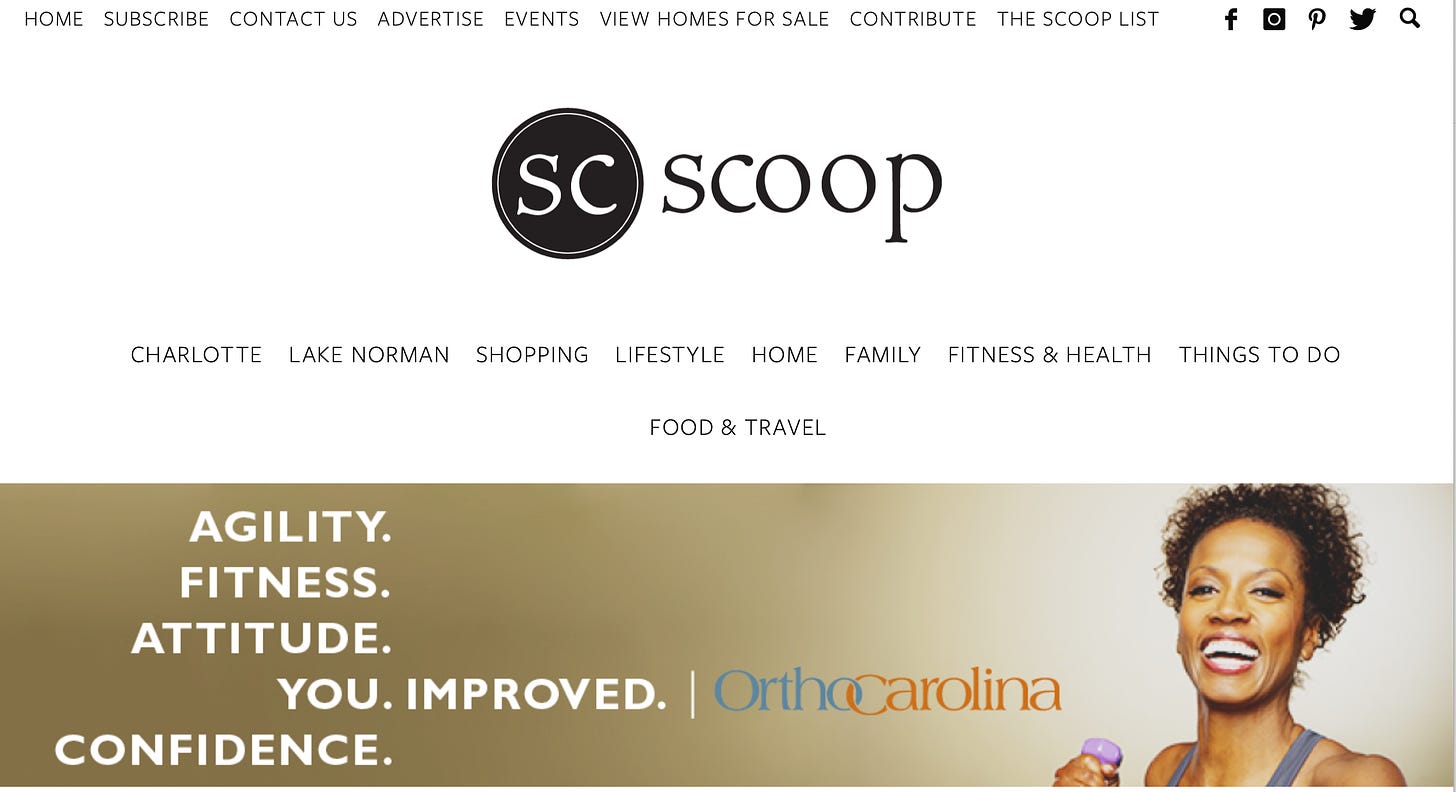Inside OrthoCarolina’s new-media ad strategy
’Relevant’ marketing builds loyal following among 125 partners; support ‘changed the trajectory’ for local media start-ups
If you read local digital media, go to local sporting events or listen to local podcasts, you’ve probably heard the name of OrthoCarolina, the big Charlotte-based orthopedic practice.
And that’s just how OrthoCarolina wants it.
Like almost no other company in the Charlotte region, OrthoCarolina has embraced a strategy far different than the traditional TV and newspaper ads and boosted social media posts that are staples of usual marketing. Instead of paying for clicks or promoting its own corporate content, OrthoCarolina is spreading money around to 125 different organizations in the area and hoping to become top of mind when you inevitably twist your ankle, tear your meniscus or dislocate your shoulder.
It’s a strategy that’s not risk-free, because it is unusual for Charlotte, and the company exercises no control of messages emanating from its many partners. But Blair Primis, the company’s senior vice president of marketing and talent management, tells The Ledger that the company’s approach reaches millennials and others where they actually are and builds long-term goodwill. He’s also credited with helping many of Charlotte’s new-media startups get off the ground.
“We are a part of so many things,” Primis explains. The key, he says, is reaching potential future customers and “being relevant in their lives.”
As Primis elaborated on a recent podcast:
Nobody woke up this morning who feels good and is like, “Let me see what’s going in the news. Let me check my Google homepage. I wonder what’s going on in orthopedics today? Let me just check out orthocarolina.com.” No one does that.
Since they don’t, I need to be relevant in their world. If I have an article that got into their news feed about why yoga is good for your lower back, or talking about what proper shoes you should wear, or that we are supporting a community walk effort in FreeMoreWest … it becomes much more appropriate for us to be part of their world than making them be part of ours.
Primis declined to disclose OrthoCarolina’s marketing budget, other than to say it’s about 1% of the company’s revenue. His marketing team consists of five people. OrthoCarolina, the third-largest private orthopedic practice in the country, has 150 doctors at 30 locations between Winston-Salem and Charlotte. It was formed in 2005, with the merger of Charlotte Orthopedic Specialists and Miller Orthopaedic Clinic.
Primis joined 10 years ago after stints in marketing at McDonald’s and at an agency. The strategy he has pioneered taps into many of the changes afoot in marketing and consumer preferences:
- Customer source: Traditionally, customers come from referrals. OrthoCarolina’s approach goes directly to potential patients.
- Demographics: With so many newcomers in Charlotte, Primis believes OrthoCarolina needs to be out in the community constantly and not just rely on having a strong, well-established brand.
- Long-term vs. short-term: While older consumers are more likely to need orthopedic care, OrthoCarolina’s strategy appeals in large part to the active under-40 set — who like it or not will be older someday.
OrthoCarolina has put money into supporting high school sports, 10K races and community walks. In local media, it has backed Charlotte Agenda, the Queen City Podcast Network, a soccer site called Soccer ‘n’ Sweet Tea and an advertorial publication aimed at women called Scoop Charlotte.

More than banner ads: The company’s approach is “definitely not conventional,” says Glenn Burkins, publisher of Qcitymetro, a digital publication aimed at African Americans that does not count OrthoCarolina as an advertiser. OrthoCarolina, he says, was one of the first locally to realize that it should associate with organizations that have dedicated followings, not just throw money somewhere to spread a marketing message. “People realize they need to do something more than simply put a banner ad on a site.”
That approach has represented a lifeline to new local media companies.
“In Charlotte, we have this really neat ecosystem of experimental media. I don’t think you’d have that otherwise,” says Andrew Dunn, a former editor with Charlotte Agenda and a former Observer reporter.
Tears of joy: Some founders of those companies agree:
- In a statement to the Ledger, Agenda founder Ted Williams said OrthoCarolina became its first advertising partner in 2015, “when the Agenda was just a five-page point deck. I remember calling my wife on the car ride home from that meeting and crying as I told her the news. Their decision to buy advertising from us changed the trajectory of our company.”
- Susu Bear, publisher of Scoop Charlotte, said: “OrthoCarolina was one of our first underwriters and helped us launch both the Fitness and Women’s Health categories on our platform, which in turn supported dozens of small, local businesses, particularly those owned or operated by women.”
(Editor’s note: In case you’re wondering, The Ledger has neither sought nor been offered money by OrthoCarolina, and we don’t accept sponsorships from companies we write about.)
There are occasional controversies. The company used to back the Charlotte Eagles soccer team, which came under fire in 2016 for its religious stance that prohibited gay players. OrthoCarolina no longer sponsors the team. Primis says potential customers are smart enough to distinguish between an organization’s policies and those of a sponsor.
Competition: Success in advertising can be hard to quantify. OrthoCarolina, Primis says, is doing well, and it needs to stay strong to ward off future competitors. Atrium Health and Novant Health also have orthopedic and sports-medicine practices.
The next frontier, Primis says, is voice search — using Alexa and other personal assistants. The field is growing quickly, and OrthoCarolina, like other companies, wants to be there.
“If we’re not ready for that,” Primis says, “we will miss the opportunity to get patient volume.”
This article originally appeared in the Jan. 24, 2020, edition of The Charlotte Ledger newsletter.


